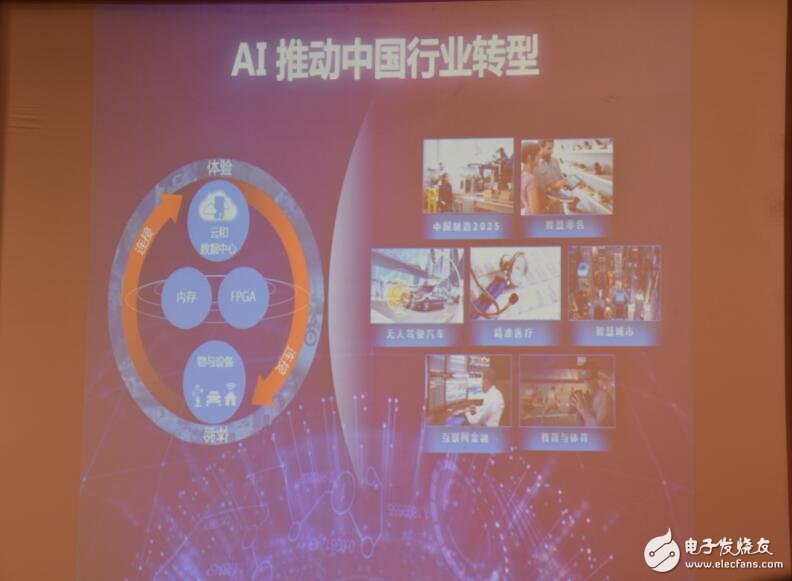China seems to be at the forefront of artificial intelligence (ArTIficial Intelligence, abbreviated as AI).
In the middle and late May, the 2.0 version of Google AlphaGo will be in China's Wuzhen with the current ranking of the world's number one professional nine-segment player Ke Jie to play Go "human-machine war." In March of last year, the 1.0 version of AlphaGo has defeated Li Shishi, and this time Ke Jie can save the face of humanity and receive global attention.
At the same time, the artificial intelligence industry chain accelerates the layout upstream and downstream. On April 5, Inspur announced the establishment of an artificial intelligence department, which will launch an innovative computing platform for AI applications. Prior to February 16, Baidu decided to establish a secret business division to accelerate the process of artificial intelligence productization and marketization.
Ba Damin, global president of McKinsey, pointed out that although China has good reason to be optimistic about its potential in the field of artificial intelligence, China must continue to strive to maintain its leading position and maximize its economic potential.
Next wave
Artificial intelligence is a new discipline that simulates human consciousness and thinking process. In the past 60 years, although the artificial intelligence system has already completed the first victory for the top humans - IBM's Deep Blue computer defeated the chess master Kasparov in May 1997, but For many years, the process of commercialization and commercialization of artificial intelligence has not been optimistic.
On the contrary, top human representatives such as Professor Hawking of the University of Oxford in the United Kingdom even issued a warning that “the thorough development of artificial intelligence may lead to the demise of humanityâ€. However, in March 2016, AlphaGo defeated Li Shishi, and the world's enthusiasm for artificial intelligence seemed to be completely ignited.
"Now the mobile Internet is in the platform period, and whenever a wave reaches the maturity stage, it means that the next wave will start." Wang Weijia, executive director of the Digital China Federation, and the founding partner of the company, told China Business News "Reporter, artificial intelligence is the next wave. The impact of this wave "is at least the order of magnitude of the Internet, even larger, and the impact on society will be more profound."
Wang Weijia believes that the current artificial intelligence is equivalent to the Internet in 1994 - through a 64K international line on April 20, 1994, full-featured access to the Internet, which has opened up the rapid development of China's Internet industry for more than 20 years. And now there are no artificial intelligence startups listed.
"Unlike the previous scientific revolution, artificial intelligence is a major opportunity for China in a few decades. This opportunity can help us achieve a leading edge." Xiaomi Chairman Lei Jun told reporters that many of the world's top artificial intelligence experts are Chinese. Because Chinese people attach importance to mathematics education since childhood, they have an advantage in algorithms, and the recent strict US immigration policy has also given China the opportunity to attract top talents from overseas.
Card position war start
Zhang Xiaorong, a senior researcher at Tencent Research Institute, believes that on the artificial intelligence track, the algorithm is heaven, the computing power is the ground, and the chip is the core. Whether China can achieve cornering overtaking on artificial intelligence, we must first see whether it is doing something in the core position. .
At present, in the field of AI chips, there are mainly four major schools of GPU (ie, visual processor), FPGA (ie, field programmable gate array), ASIC (ie, ASIC), and brain-like chip. Among them, in the GPU field, only NVIDIA and AMD players. In the field of FPGAs, there are 4 players in Xilinx, Altera (which has been acquired by Intel for $16.7 billion), LatTIce, and Microsemi. In the field of ASIC, Intel, Qualcomm, Microsoft, UK's Graphcore, China's Institute of Chinese Academy of Sciences, Horizon Robot, etc., all have layouts. In the field of brain-like chips, IBM, Qualcomm, China Institute of Computing Technology, Peking University, Zhongxingwei, and Xijing Technology have also achieved good results.

Relevant statistics show that there are 13 companies in the United States and 7 companies in China have entered the field of AI chips. But in general, the United States has giants such as Intel, Qualcomm, IBM, Microsoft, etc., as well as medium-sized companies and startups. Outside of a medium-sized company, the remaining six are start-ups.
It is worth noting that Intel has recently announced that it will integrate all its AI business into the newly established AI product division and AI lab, and Qualcomm's $47 billion acquisition of NXP has recently been approved by US regulators, which will become Qualcomm's entry. An important bridge in the field of AI.
Solar home energy storage power supply
SHENZHEN CHONDEKUAI TECHNOLOGY CO.LTD , https://www.szfourinone.com